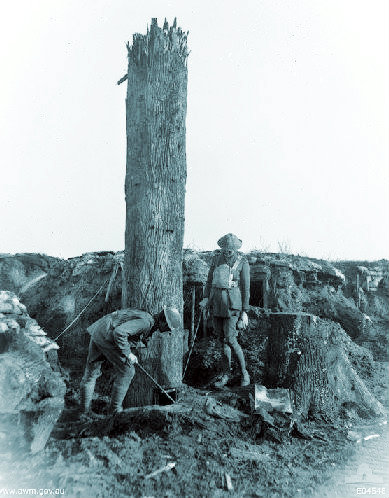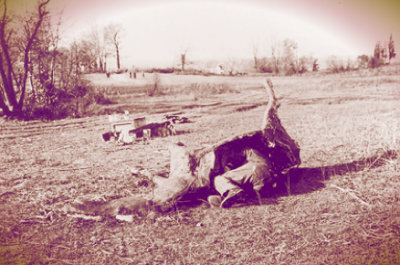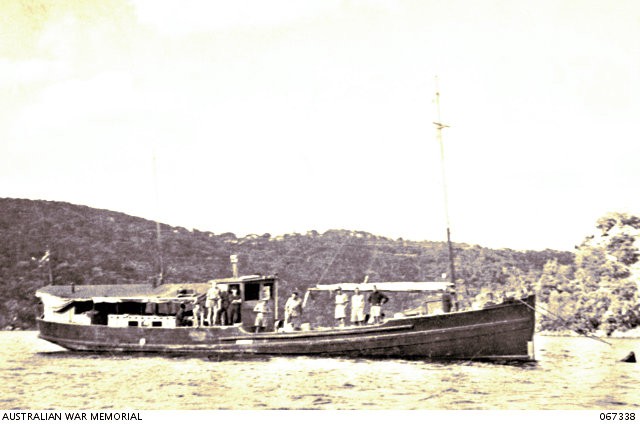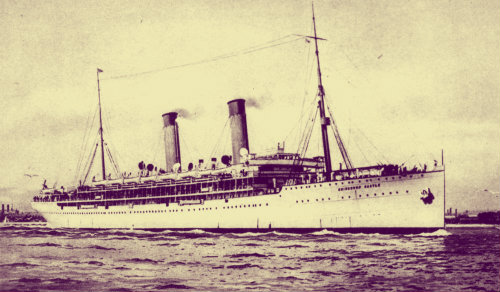Arguably, the disguises mentioned in this article may be the most outrageous but believe it or not, they worked!
The Fake Tree
If you are wondering how to fake a tree, you can check out how the Jerries [this author assumes you know who they were] did it way back in World War One.
The setting for this outrageous disguise was the Oosttaverne Wood located near Messines, Belgium and the year was 1917.
Oosttaverne Wood was a “dead forest “. It was made up of a hundred or so dead trees with a muddy ground and surrounded by more nonliving matter. As the Germans wanted to spy on British artillery but couldn’t do so [a spotter hiding behind a dead, leaf-bare tree would be very, very obvious], they came up with an outrageously brilliant disguise for their spy — a fake dead tree.

So, they fashioned several sections of steel pipes into an armor-plated fake tree that stood 25 meters tall completed with painted iron bark. So as not to raise any suspicions from the enemy [a dead tree growing overnight would be very questionable, right?]. The German troops had to cut a real dead tree down in the dead of night so that they could fix their fake tree in its place. And as axing down the tree produced loud noises, they had to do the cutting under the cover of artillery fire.

With all these done, the fake tree was put in its place with a German soldier sitting [at least, a chair was structured] inside spying on the Tommies through a small window.
The biggest surprise of all was that the Germans were able to get away with their “fake tree” scheme for SEVEN UNBELIEVABLE MONTHS!
It wasn’t until the Brits blew the Germans’ trenches from below that the artificial hollow tree with a German soldier inside was discovered. Even then, they camped beside it for a while before they took notice of it and eventually found its secret.
Talk about being too effective!
The Fake Horse Carcass
Well, World War One was one war of camouflages as the next item in this list of outrageous but genius disguises were from this conflict as well.
How do you sneak up on your enemy when there’s a wide expanse of No Man’s Land in between you two? The French had the perfect answer to that — a fake horse carcass.
The exact story of how the French came into this fascinating disguise is unknown. It is commonly known that horses were very vital and widely used during the Great War that was why it was no wonder the land between trenches were not only littered with the remains of dead soldiers from both sides but with horses’ remains as well. It would have been in between fights that the French realized that the size of a dead horse’s body was big enough actually to hide a soldier inside.

Of course, using a real dead animal was horrifyingly disgusting so, they opted for a safer and less repulsive approach — by making a fake horse carcass through papier-mache.
So, they made just that — a papier-mache horse a with a hollow body big enough for a single sniper to crawl into and a gun port built inside situated at where the anus was supposed to be.
When night came, French troops dragged the body of a dead horse off from the desolated No Man’s Land and replaced it with the fake one with the sniper inside. That soldier even had a wire with him connected to his trench so that he could report back the whereabouts of the enemy.
The disguise worked until the third day when a German soldier spotted the sniper getting out of the decoy. The Jerries went on to destroy it, but that didn’t stop the French from making more fake horse bodies.
Fake Cruise/Merchant Ships
The third in this list of crazy but brilliant war disguises is still from the Great War, particularly in naval warfare.
Apparently, German U-boats were causing heavy losses for the British shipping industry during the first few months of the conflict. Furthermore, the German submarines were attacking ships that couldn’t defend themselves – like merchant sea vessels – that were either not escorted, older or smaller.
As the British badly needed the supplies brought by these merchant ships, its army’s high-ranking officers decided to do something about the problem. The solution? Let British warships pose as innocent merchant vessels and even cruise liners to lure the German U-boats and eventually, bring them to their end.
The plan was logical, alright, but the antics the British Navy employed to carry out the disguises were downright crazy!
While some warships were made to look like either old unarmed vessels or merchant ships, some were made to look like cruise liners complete with soldiers playing passengers on vacation. Some even had to pose as women – in complete costumes – lounging on the ship’s deck and cuddling to their comrades. They also practiced a simulated “abandon the ship” scheme wherein half of the crew of the vessel would “panic” when the U-boat surfaced making a show of running frantically into each other, screaming, tripping, falling and even abandoning the ship. The other half stayed hidden to man the ship’s guns.
When the U-boat surfaced and got shot-distance close, all hell would break loose.
Reportedly, some 70 German U-boats fell for this disguise with 14 sunk. This fact made WWI soldiers who cross-dressed the seventh in the list of leading causes of death during the Great War.
Fake Identities
The fake identity guise is too commonly used when it comes to warfare. But then, some just take their fake identity disguises to a whole new [and outrageous] level like these below.
First stop, the American Civil War.
21-year-old Sarah Emma Edmonds cross-dressed as a man to get into a Union Army as she felt it was her patriotic duty to serve her country and the side she believed in. Sarah, as Private Frank Thompson, went on to become a master of disguises assuming several identities – men and women, mind you – to spy on the South.
One time, she dyed her skin black using silver nitrate [she was a white lady], donned a wig, assumed the identity of a negro named Cuff and walked right up to the Confederates announcing that “he” wanted to work for them as a spy. She must have looked and sounded so convincing that the they bought it. Eventually, they ended up losing plans to a fort and Sarah was able to learn about the identities of several Confederate spies which she brought with her – along with the plans – as she “escaped” back to Union lines.
World War Two may not be fraught with crazy but genius disguises compared to the Great War, but there were one or two worth mentioning in this article.
One example of WWII’s version of great but crazy disguises was Operation Jaywick.

It was in 1943 when a 28-year-old British officer teamed up with a 61-year-old Australian civilian in coming up with a plan to attack the Japs harboring in Singapore. They were going to pass themselves off – along with a team of Commandos – as Malay fishermen traveling from Australia to Singapore then eventually, destroy Japanese ships moored in Singapore Harbor using limpet mines.
Their plan relied heavily on their disguise not being discovered. There was just one big problem — how would they be able to play the roles of brown-skinned Malay fishermen convincingly when the team was made up of white soldiers?
Well, they dyed their skin brown, donned on the usual garb of Malay fishermen, get on a Japanese coastal fishing boat owned by the Australian civilian who devised half of the plan. They traveled 2,000 miles to Singapore and mind you, the waters between Australia and Singapore were controlled by the Japanese at that time.
Unbelievably, their plan succeeded! They were able to sink seven Japanese ships and their travel to and from Singapore was uneventful except for one frightening moment when a Japanese patrol boat approached their vessel carefully.
The Highest Honour – an Australian-Japanese Film about Operations Jaywick and Rimau
But arguably, the craziest example of these fake identity disguises happened in 1973 during the Israeli raid on Lebanon known as Operation Wrath of God.
Some of the members of the group of Israeli commandos who executed the plan were made to look like women [yes, they cross-dressed] and they were paired off with their comrades to pass off as lovers. They were able to walk past bodyguards and security successfully killing their targets including three PLO [Palestine Liberation Organization] leaders.

One interesting fact about the above-mentioned account was that among the Israeli commandos who cross-dressed for the operation was one who became Israel’s 10th Prime Minister, Deputy Minister and even Defense Minister — Ehud Barak.
Fake Armies
A perfect example for crazy fake army disguises that the other side actually bought was WWII’s Ghost Army, a tactical unit of the US Army built purposely for deception. True to its name, the unit’s members were tasked to mimic other US Army units [the real ones] to confuse the enemy.
The Ghost Army used fake and inflatable tanks, trucks, artillery and went on to utilize the sounds of soldiers moving about to fool the Germans into thinking the US had troops in a certain place when there wasn’t. Because of the unit’s works, German troops were deflected from the locations where larger Allied combat units were positioned.
However, the Ghost Army was not an original idea by the US Army. They copied it from the British who used the same tactic for the Battle of El Alamein in 1942.
Another ghost army-ish account dates back to the 1999 Kosovo War. NATO sent a great number of warplanes to take offensive – literally rain ammunitions down – against Serb troops in Kosovo for about two months and two weeks straight. After the campaign, NATO commanders reported that the force they sent in Kosovo destroyed a total of 120 tanks, 220 armored personnel carriers, 450 pieces of artillery and killed off a total of 5,000 Serb soldiers.
But to their surprise, the Serb army that rolled out of Kosovo after the war ended was pretty much the same as the one that moved into the country at the start of the conflict. So, what did NATO’s warplanes hit during their 78-day siege against the Serbs? Fake trucks, tanks, and even soldiers.
What was crazy and funny was that the Serb army did not even try very hard to fake their own. For one, they made artillery guns out of pipes and plastic sheets!
The Fake Island
How do you make a big ship pass through enemy-infested waters and air without being singled out? Our Dutch mates from World War Two had the perfect solution — by camouflaging it as an island! As crazy as that sounds, it did work. Why would it be included in this list of crazy disguises if it did not serve its purpose?
February 1942, Battle of Java Sea. The Japs had managed to wipe out an entire Dutch-American-Australian-British combo fleet except for one. The minesweeper Abraham Crijnssen was the only Dutch warship left standing, er, sailing. The problem was, the ship did not possess any guns to combat the enemy and was severely slow sailing that its crew knew running straight towards Australia would only end up in disaster and them being fodder for the sharks.
So, they came up with the idea of disguising the Abraham Crijnssen as juts one of Indonesia’s 17,508 islands. The crew set out to paint the ships’ vertical surfaces making them look like rock cliffs while real trees were cut out and placed on deck to make it look like a jungle canopy.

So as not to raise suspicions, the Abraham Crijnssen “island” only moved at night. In the mornings, the Abraham Crijnssen anchored near the shore to make the ship look like another Indonesian island.
For eight days, the ship and its crew kept the charade up until the Abraham Crijnssen reached Australia. Here, the ship fought with the Allied troops until WWII ended.


